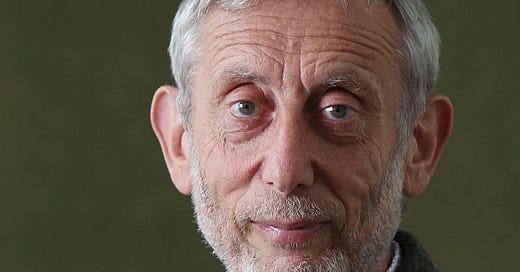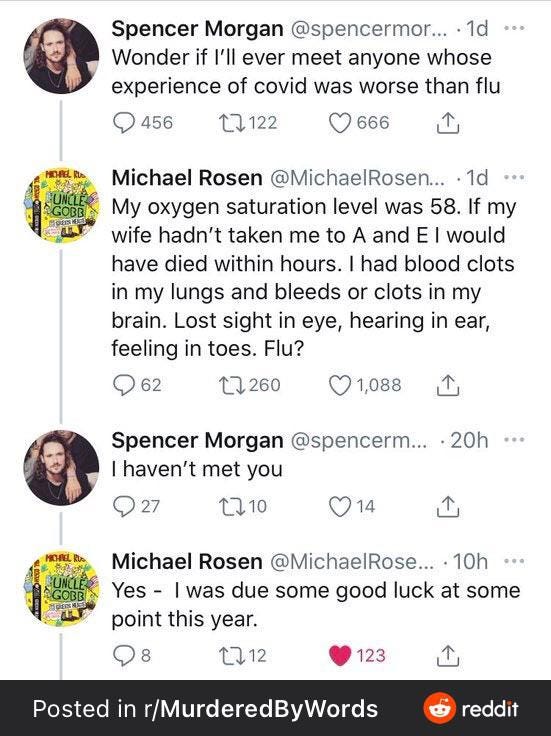Michael Rosen can make you feel better
It takes a beautiful mind to write wonderful poetry about Covid
During the recent lockdowns I read a lot of books with my four-year-old daughter. As well as having a love for stories, jokes and funny words, she has a remarkable memory when it comes to certain phrases that characters might say. Don’t get me wrong she still quotes TV shows like Peppa Pig (she says “boring” and “what!” like the titular pink pig much to my annoyance) but she will bemuse her friends by going into great detail about printed characters’ foibles. She is keen on anything as long as it has pictures which means my comic books are fair game. So much so I had to hide Daniel Clowes’ Ghost World because changing the inappropriate words became too much like a Radio 4 panel show. (“No, she’s got a huge tumour on her face. I guess that beauty mark in her cheek turned out to be cancer…” became “No, she’s got a huge food mark on her face. I guess that if it stays there long enough it becomes infected. I then got “What’s infected mean, Daddy?”). Let’s just say I won’t be making the same mistake with Maus and From Hell.
She has an inquisitive mind and one of the writers that can sate her curiosity in a much more appropriate way is former children’s laureate Michael Rosen. Discovering his work at my age is one of my favourite surprises of parenthood and I enjoy his poetry as much as my daughter does. He has a unique talent in making the mundane both profound and relatable, something much needed during the pandemic. The poem I’ll like to share with you is about illness and was first written in the 1980s and reminds me of when I was off school in that decade. Being sick, sadly, is something Rosen has a lot of recent experience of, having come close to dying from Covid and this year’s Many Different Kinds of Love is a moving account of his hospitalization. So much so it’s a useful tool in explaining to my daughter how lucky her family was to remain healthy despite huge infection rates.
Most of my heroes are sportspeople having spent a childhood (and adulthood) using cricket and football as a release valve. But as a fellow writer I place Rosen in this bracket of superhuman reverence. If I ever need motivation to file copy or chase a story I just think of the effort it must have taken to put together Many Different Kinds of Love while suffering from long Covid. His other work aimed at children are also soothing for people like me who had traumatic childhoods especially as he doesn’t offer a romanticized view of early life. These poems most of all offer hope.
Feeling Ill
Lying in the middle of the bed
waiting for the clock to change
flicking my toes on the sheets
watching a plane cross the window
staring at the glare of the light
smelling the orange on the table
counting the flowers on the curtain
holding my head with my hand
hearing the steps on the stairs
lying in the middle of the bed
waiting for the clock to change.
I took a lot of sick days off school to escape bullying. I knew how to hoodwink my mother from the age of eight despite her being a nurse and would often lie in bed like the unnamed person in Feeling Ill not doing anything much. My mother never really cared if I was ill or not, in truth, as she wasn’t very interested in many aspects of my life.
I read books, played on my computer, watched TV and could hear how quiet the house was during the day. My mother worked nights and slept most of the time. I lived in an imaginary world where I didn’t have to avoid fights with people who went to my school. I’m not sure how I found the stoicism to overcome the humiliation of their racist taunts but I think “skiving” was part of it. It gave me some breathing space.
There’s another word for this: depression. I was completely fed up with my childhood and wanted to escape but when you’re aged about eight this kind of environment is a prison. It’s taken a long time to break this cycle and it’s only since I’ve had kids that I’ve not seen lying in bed as an escape from reality. I’m busier and happier.
The line in Feeling Ill about “counting the flowers on the curtain” resonates a lot with me especially as I remember counting the grooves in a lampshade over and over again. Some people might call this “mindful” but being aware of my problems wasn’t much use if no one apart from me was interested in them. Especially as being in bed didn’t give me any agency over them.
You would think that nearly being blinded by Covid would earn Rosen some goodwill from people online. But still individuals argue with him that the virus is “no big deal” and doesn’t affect people that don’t have underlying health conditions.
To his credit, Rosen engages with these misinformed science-denying trolls and in a way that is humorous. But he shouldn’t have to. I wrote an article for the BBC on conspiracy theorists and one of the experts, Dr Michael Butter, professor of American literary and cultural history at Germany’s University of Tübingen, said this:
Researchers have found that people who are more fearful and anxious have lower perceived feelings of control over situations. So people with those kinds of traits tend to believe in conspiracies more.
The irony of Rosen being an amiable presence on Twitter is that social media spreads these conspiracies and makes people more anxious. It does also show why it’s so vital for him to be on the platform and tell people how deadly Covid can be.
I didn’t know anyone well who died directly from the virus but a very good friend of mine was taken away from us because health services were overrun during the first lockdown. For this article I’m calling her B as I don’t want to cause her family and friends any more distress. She died of a brain haemorrhage alone in her house after not being seen by a specialist the day after a hospital visit.
B was found by a friend who was with her child and because of social distancing concerns I never went to her funeral and nor have I had the chance to mourn her loss. We didn’t have many mutual friends and so she lives on in mine and my partner’s memories.
To make matters worse I didn’t know she was dead until a month after the event. In the meantime I was texting her silly videos and jokes as I knew she was struggling with loneliness and with her finances - she broke down in tears shortly before her death on a phone call when she described to me he humiliation of using a food bank for the first time as she was unable to work as a hairdresser.
So these conspiracy theories that claim Covid didn’t overrun our health services are obscene and it pains me to say that I know numerous people who believe in them. I don’t hate them for it but wish they wouldn’t seek outlandish explanations to hide from the stark truth: politicians have failed us through their incompetence. There’s no conspiracy other than the world is an uncertain place and rightwing governments act selfishly at all times.
I’ve been lucky in this pandemic that I’ve not been ill once. I’m quite a sickly person usually and it’s been a joy to not suffer the usual colds and viruses which I attribute to social distancing and the adoption of vitamin D supplements.
I’m particularly fortunate as I feared getting Covid since it can be disproportionately worse for people of South Asian origin. It’s perversely ironic that among so many deaths and suffering I was healthier than ever before.
But I never took my health for granted and the pandemic changed me especially after the Black Lives Matter protests. I became anti-racist and where possible only interview people of colour and seek out stories about minorities that have seldom been told. I’m currently trying to set up a diversity fund for beer writers as well as writing an article on how the colonisation of India is exoticised by companies marketing IPA.
I wouldn’t have had the energy to do these things if I was ill and that’s why Michael Rosen should be applauded for producing Many Different Kinds of Love this year. More importantly by producing this book detailing his battle to overcome Covid we gain a unique insight into how the NHS was under so much strain and how several medical heroes saved his life despite these huge challenges.
As well as the closeness to death, we learn from Many Different Kinds of Love how arduous rehab was and this line left me in tears:
She says that she knows/ children who like my books./ I'm proud again/ but then I'm sad/ I'm sure it won't be well enough/ to stand in front of 500 children/ ever again/ telling them my poems and stories/ hearing them laugh/ I say that to her
It’s a remarkable book especially as most of his children’s work is very silly. After all the poem I quoted above, Feeling Ill, is from a collection called Bananas in My Ears and features children-sized submarines, hard-boiled eggs with hard-boiled legs, Rottybottytex medicine and a doctor who hides in cupboards.
Rosen shows the best way to approach darkness is to be able to make a nonsense of it.
“I’ve been lucky in this pandemic that I’ve not been ill once.” Since I wrote this line I’ve been stricken with acute tendonitis in my Achilles’ heel and have to spend a week resting. So I think it’s a good time to have a week off writing these emails. See you in two weeks and stay safe.





